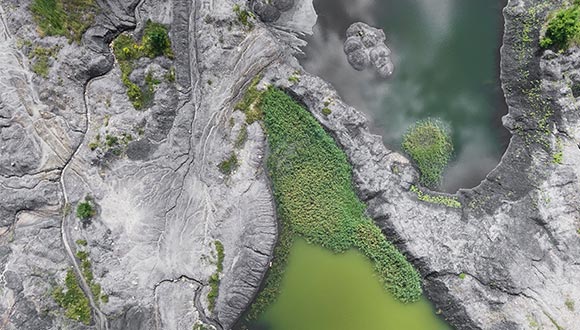Soils
Satellites are overestimating vegetation's ability to absorb atmospheric carbon dioxide
According to an article by CREAF researchers Benjamin Stocker and Josep Peñuelas published in Nature Geoscience, drought impact studies based on satellite data do not factor in the effects of soil moisture.

CREAF researchers challenge the notion that nitrification occurs only in soil
Human-induced increase in nitrogen deposition profoundly alters nitrogen (N) cycling globally. Yet, the ultimate fate of nitrogen deposition on forest ecosystems isn’t fully understood. Rossella Guerrieri, a Marie Skłodowska-Curie fellow in CREAF sheds light on the overlooked leaf microbial transformations of nitrogen deposition and its contribution to N cycling.
Catalonia's agricultural soils contain four years' worth of carbon emissions
The soils below dryland crops contain 54% of Catalan agricultural land's 48 million tons of organic carbon, although the highest concentrations are found in rice fields and pastures.
Climate change is already threatening the Mediterranean ecosystems of Catalonia
An extensive review of studies and databases reveals that drought and an increase in temperature are already causing species substitutions, greater aridity, higher forest fire risk, lower soil fertility, and lower water availability, among other negative impacts.
The loss of soil carbon can accelerate climate change
The journal Nature has today published a study which had the participation of CSIC scientists at CREAF, Marc Estiarte and Josep Peñuelas, which demonstrates the relationship between the release of carbon from soils and the acceleration of climate change.
Degraded land restored with sewage sludge sequester up to 37% more carbon than un-amended land
A study carried out by researchers from CREAF and the UAB shows that restoring degraded land with sewage sludge aids carbon sequestration in the soil. These organic wastes improve soil structure and the growth of plants, and these are eventually incorporated into the soil as soil carbon.
Droughts alter microbial diversity of the land and increase CO2 emissions
Researchers from the UAB, CREAF and the National Museum of Natural Sciences (MNCN-CSIC) have analysed how the deterioration of woods caused by droughts associated to global warming are affecting the microbial composition of the soil and modifying carbon cycles.

